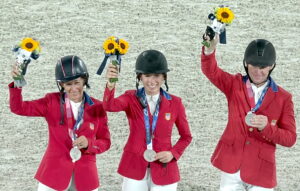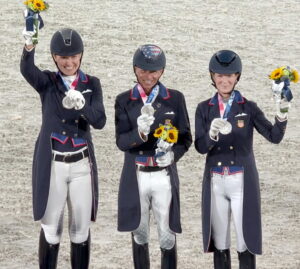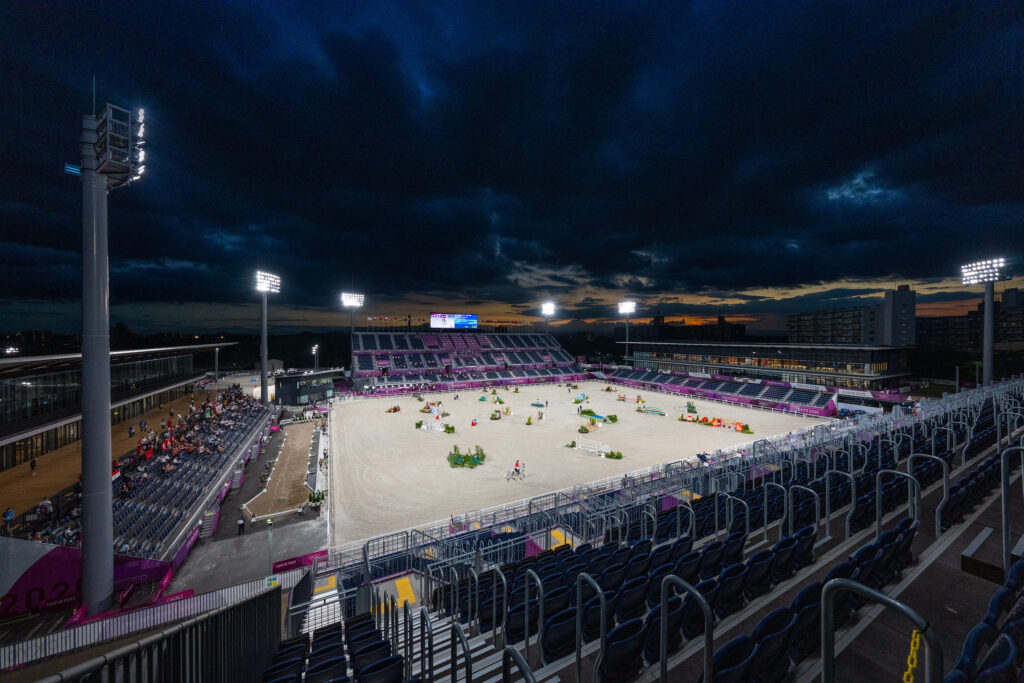The Olympic closing ceremonies didn’t wrap up the global athletic competition in Tokyo. Now the U.S. Equestrian Federation is focusing its attention on the Paralympics, which begin there Aug. 24 and run through Sept. 5.
But first, after scores of long days and four extremely strenuous weeks away as American Olympic riders trained in quarantine and then competed, USEF Director of Sport Will Connell was able to make a brief visit home to Gladstone.
His objective? To “freshen up, get a haircut, see the dog, weed the garden and go back again.”
His plans for a short vacation in Japan before the Paralympics were scuttled due to that country’s strict Covid regulations for foreign visitors. So after putting a bit of temporary distance between himself and Tokyo’s Baji Koen Equestrian Park, Will had a chance to reflect on U.S. Olympic equestrian efforts, which in the midst of difficult circumstances achieved team silvers in dressage and show jumping, along with a sixth-place finish for eventing.
“I’ve done a few Games and championships; I have to say it was kind of at the last minute we got this one done,” said Will, who was the British Equestrian Federation’s performance director prior to coming to the USEF in 2014.
He had only six weeks’ notice to change quarantine plans for the eventing and dressage teams when there was a problem with direct flights from the U.S. to Tokyo. Both wound up in Germany, as did the show jumping team, which moved to the Aachen showgrounds after the farm where it was to be based suffered massive flood damage.
And with “huge logistical challenges in the build-up,” it wouldn’t have gotten done “if it hadn’t been for the team at USEF,” Will emphasized.
“They were just outstanding, booking and rebooking flights, changing this and that. I’m not going to pretend it was easy or fun, to be honest.” But the process paid off.
Discussing the athletes, he said, “For jumping and dressage, they had to really dig deep to get the medals they got.” And, he added, “It was good to finish a team in eventing.”
Will called that a step forward from the 2016 Olympics (where Philip Dutton earned an individual bronze, but the team did not finish) and the 2018 FEI World Equestrian Games, where the eventing squad was eighth of 18 teams.
“Eventing could have been better in the (stadium) jumping, probably (no team member was fault-free over two rounds), but they finished as a team, so that pointed in the right direction,” said Will.
“The team medals in dressage and (show) jumping were a real kind of demonstration of a team pulling together and pulling a medal out of what certainly could have been `not a medal’,” said Will.

The U.S. silver medal show jumping team: Laura Kraut, Jessie Springsteen and McLain Ward.
He praised the efforts of the disciplines’ managing directors.
“I can tell you categorically that if it hadn’t been for Lizzy (Chesson) in jumping or Hallye (Griffin) in dressage, they (the squads) wouldn’t have won the medals.
“They are as much part of it as the chefs (d’equipe),” he emphasized, while also citing the work done by the USEF eventing managing director, Jenni Autry, in keeping her team going.
Discussing the complexity involved in the day-to-day operation of an Olympic effort half a world away from home, intensified by the Covid situation, he noted about everyone’s contribution, “Without every spoke on the wheel, the wheel implodes.”
He mentioned that in dressage, with riders Adrienne Lyle, Sabine Schut-Kery and Steffen Peters not having the chance to compete in Europe before going to Tokyo, “We really thought we’d be fighting for bronze. Then to realize we could actually make a grab for silver was incredible.” And successful.

The U.S. dressage team of Adrienne Lyle, Steffen Peters and Sabine Schut-Kery.
The show jumpers, who were able to contest a series of Nations Cups in Europe during the spring, had to cope in Japan with a new and untried Olympic format, which Will called “very difficult.”
It involved having only three people on a team and no drop score, while the individual competition uncharacteristically was scheduled before the team effort. Kent Farrington, who rode only in the individual portion of the competition, played a role from the ground in the team endeavor.
“They all pulled together. Kent was a fantastic reserve, really helping out the team, really part of the team. He was brilliant, actually.”
Knowing that an individual medal was “a longshot” (and as it happened, no U.S. rider made it to the individual finals), the emphasis was on getting a team medal. And that’s just what the squad of Laura Kraut, Jessie Springsteen and McLain Ward did in a dramatic jump-off with the Swedes, whose horses dropped only two rails during the entire show jumping program.
“In jumping, the best team won; undoubtedly, the Swedish were the best team,” observed Will. But the U.S. was right behind them with only the difference of a few instants on the clock in the tie-breaker. He praised the expertise of course designer Santiago Varela, whose routes and fences highlighting Japanese culture were key to the way show jumping worked out.
One huge plus for equestrians was the quality of Baji Koen. The park had been used for the 1964 Tokyo Olympics, but of course was marvelously updated for these Games, with climate-controlled stables, a galloping track, indoor arena and fabulous footing.

The arena at Baji Koen with jumps, minus spectators. (Photo courtesy FEI)
“The facility is fantastic, no doubt about it. It’s one of the best equestrian facilities we’ve seen in terms of what it will deliver in legacy,” said Will.
All the equestrian competitions were held at Baji Koen except the eventing cross-country, which ran at Sea Forest, a former landfill on the water about an hour away.
“Having to move to the cross-country (the night after the eventing dressage concluded) was challenging. The truth would be probably with no spectators the whole logistics of getting around Tokyo was a lot easier,” Will noted.
But the list of restrictions that included keeping the general public out of the stands at competitions meant all athletes and the staff from every country could not sightsee, or even eat at a restaurant. They were confined to hotels and the Athletes’ Village, permitted only to go to the venues where they trained and competed.
“It was difficult for everyone across all sports, being in that cocoon,” Will pointed out.
Of course, the most important thing was not to risk having Covid infiltrate the cocoon; athletes did not want to lose their chance to compete by testing positive for the virus, as happened with pole vault world champion Sam Kendricks, who missed his event as a result, and 28 others. More than 675,000 tests of accredited personnel were conducted, with a positivity rate of approximately 0.02 per cent. From July 1 through a week ago, 378 cases affected residents of Japan, while 170 involved non-residents.
The way the Games were planned for equestrian sport undoubtedly will be the subject of many, many meetings before Paris 2024. The FEI (international equestrian federation) has already said it will take a long look at how the competitions went and what revisions should be made.

Will in his office in Gladstone.
Will stated, “There has to be a discussion…about the format; the format for jumping, the scoring for the team dressage.” (The live scoring for dressage was in percentages, while the totals for the team scores were in points.) He also wondered about having a one-hour break before the final group of riders in team dressage.
“Is that a buzz kill if you’ve got a crowd?” Will mused
He added, “The format for jumping needs looking at. I’m not sure that no discard (score) works.”
He also questioned, “how many teams would not have completed in eventing if you didn’t have this weird rule that you could carry on if you’ve been eliminated (with a 200-point penalty added). It’s a bit weird when you see someone who hasn’t done dressage and cross-country do the show jumping and still have three down.”
The question many people are asking about the Tokyo Olympics is: Was it worth it? Remember, polls showed a majority of the Japanese people were against holding the Games, and there was muttering about cancelling them even days before they began.
“I think that’s something that will be discussed and debated for many months to come, if I’m honest. I can’t put my hand on my heart and say it was 100 percent worth it, but I can’t also put my hand on my heart and say it wasn’t worth it,” said Will, emphasizing that “the Japanese did a fantastic job with all the venues, and there’s a great legacy, so that’s good.
“I think people could be inspired by the way these riders dug deep to get those medals. People can be inspired by the ability of athletes to perform–and I’m talking cross-sports–(when) there’s no spectators, and all the other challenges and you’re locked down in your room.
“There are many inspirational things to take away from it. On the flip side, yes, we were putting on a global sporting event that cost a fortune in a city that had a rising number of Covid cases. And yes, there’s plenty of reason to question why that happened,” he said, although he added, “It’s probably not the time to really analyze it. I don’t think I can say it’s black and white a good thing, and black and white a bad thing. Maybe we look at it in a few months’ time.”




